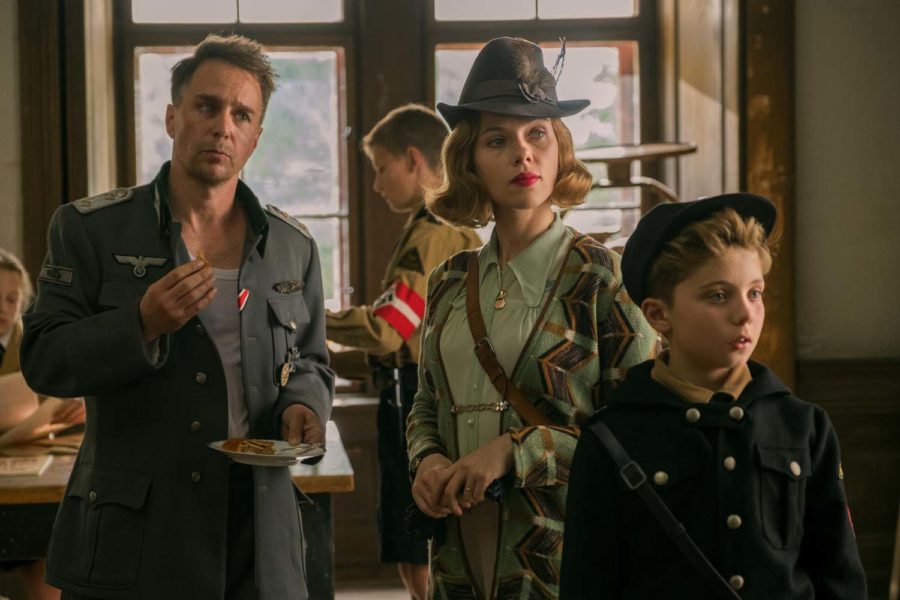“Jojo Rabbit” says nothing new about Nazis
Larry Horricks/Fox Searchlight Pictures
From left, Sam Rockwell, Scarlett Johansson and Roman Griffin Davis in a scene from the WWII satirical film “Jojo Rabbit.”
November 5, 2019
“There’s not much hope of us winning this war,” Rebel Wilson says to a group of Hitler Youth at summer camp at the start of “Jojo Rabbit.” The phrase sets the rest of the film’s tone — everyone’s aware of how the story ends. The only surprises are what happens along the way.
The summer camp she’s speaking to is one part “Moonrise Kingdom” and one part “Deliverance.” Thankfully, given the film’s irreverent tone towards Nazi atrocities, there’s very little of “The Boy in the Striped Pajamas.”
At said summer camp, a tongue-in-cheek Sam Rockwell speaks with a deliberately bad German accent — he winkingly pronounces the word “stuff” as “schtuff” — and teaches the boys to throw hand grenades, hunt each other and marshall for the coming Allied troops.
“Do you want to win the war?” he lazily asks a child who’s not participating enough. “Of course! I love killing,” the child responds. “Good,” Rockwell responds in a surly tone. “Now get out there.”
The film’s main character, 10-year-old Jojo Betzler, keeps an imaginary Hitler (director Taika Waititi) as a supportive invisible best friend and hype man. Hitler is meant to serve as a stand-in for both Jojo’s absent father and his desire to belong. But Waititi sidesteps any dark or interesting rabbit holes this could go down.
Could the German state have absorbed Jojo’s desire for a father’s love? Could that have happened to other people, turning them cruel as they longed for a connection the real Hitler would never have given them? Waititi doesn’t answer any of these questions. Instead, he just uses the film as an opportunity to jump up and down in a toothbrush mustache.
In that specific scene, Jojo bounces up and down with “Hitler” shouting “heil” with the intensity of a preteen at his first rock concert. The scene is meant to be funny, but in an age of resurgent white nationalism, it’s hard to enjoy seeing a young boy excitedly buy into a death cult just to belong. Later, Jojo’s stupid and innocent 10-year-old friend tells him that “He saw some Jews being caught in the woods … they didn’t look any different than regular people.” The line is meant to highlight children’s ultimate goodness, but it rings hollow. How could the kid not have been screwed up by this? How could anyone not have?
I use the adult actors’ actual names in this review because Waititi effectively cast them as their star personas. I don’t remember their characters’ names, and I’m not sure I’m supposed to. Sam Rockwell is a gruff Nazi officer with a heart of gold. Rebel Wilson is a befuddled subordinate with a cutting sense of comedic timing. Scarlett Johansson is impossibly poised. “Jojo Rabbit” leans heavily on this type of stylization to make its jokes funny. But the problem is that no amount of intellectual distance or awareness of the film’s constructed reality can make the Holocaust something to laugh at.
Stylization works for some films, like in “Hereditary,” where director Ari Aster shot characters in vulnerable positions like the shower or by windows to give the audience the impression that they’re simultaneously alone and being watched by an invisible presence. In Italian-made spaghetti westerns, a bleached and oversaturated desert vista serves to signal that there’s going to be a gunfight. But stylization can’t make Nazi Germany the successful setting of a feel-good movie. And it can’t make anti-Semitism anything other than horrifying.
Other staged work that references the Holocaust can do a lot with a little. In one of the most chilling scenes in Amazon’s “The Man in the High Castle,” two main characters talk on a highway as ash drifts onto their shoulders like snowflakes. It takes the viewer a minute to get it, but once the characters obliquely reference the nearby hospital the horror becomes clear — Nazi Germany won the war and the cremations continued, becoming so normal as to be ubiquitous. And Martin Sherman’s play “Bent” makes no bones about how the trains to the concentration camps were a horror unto themselves. Characters shuffle off them spiritually broken by the time they arrive.
“Jojo Rabbit” set a feel good movie in the Holocaust but avoids reckoning with it in any meaningful way. “Jews have horns,” a goofy Gestapo officer — if there even is such a thing — tells a child at one point in the film. But there’s nothing to couch the “joke.” He doesn’t later die like he would in “Inglourious Basterds,” or get his comeuppance the way he would in “Schindler’s List.” The anti-Semitism’s existence is the joke’s punchline. And at some point the jokes just stop being funny.



